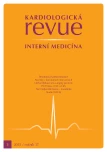-
Medical journals
- Career
Fixed‑dose triple antihypertensive combination and subclinical organ damage
Authors: P. Wohlfahrt
Authors‘ workplace: Centrum kardiovaskulární prevence, 1. LF UK a Thomayerova nemocnice, PrahaKardiocentrum, Pracoviště preventivní kardiologie, IKEM, PrahaMezinárodní centrum klinického výzkumu, FN u sv. Anny, Brno
Published in: Kardiol Rev Int Med 2015, 17(3): 249-252
Category: Cardiology Review
Overview
Most patients with arterial hypertension require a combination of two or more antihypertensive drugs in order to achieve target levels of blood pressure. On the other hand, with an increasing number of tablets, adherence and persistence with antihypertensive therapy may worsen. Fixed‑dose combination of antihypertensive drugs simplifies therapy for the patient and allows target blood pressure levels to be achieved with a lower number and doses of antihypertensive drugs. In the present case report we describe the positive effect of a new fixed‑dose triple antihypertensive therapy on parameters of subclinical organ damage in a patient with a history of poor adherence to antihypertensive therapy.
Keywords:
arterial hypertension – fixed‑dose combination – subclinical organ damage – left ventricular hypertrophy – chronic kidney disease
Sources
1. Kumagai N, Onishi K, Hoshino K et al. Improving drug adherence using fixed combinations caused beneficial treatment outcomes and decreased health ‑ care costs in patients with hypertension. Clin Exp Hyperten 2013; 35 : 355 – 360. doi: 10.3109/ 10641963.2012.732644.
2. 2013 Practice guidelines for the management of arterial hypertension of the European Society of Hypertension (ESH) and the European Society of Cardiology (ESC): ESH/ ESC Task Force for the Management of Arterial Hypertension. J Hypertens 2013; 31 : 1925 – 1938. doi: 10.1097/ HJH.0b013e328364ca4c.
3. Hsu TW, Liu JS, Hung SC et al. Renoprotective effect of renin‑angiotensin‑aldosterone system blockade in patients with predialysis advanced chronic kidney disease, hypertension, and anemia. JAMA Intern Med 2014; 174 : 347 – 354. doi: 10.1001/ jamainternmed.2013.12700.
Labels
Paediatric cardiology Internal medicine Cardiac surgery Cardiology
Article was published inCardiology Review

2015 Issue 3-
All articles in this issue
- 25th European Meeting on Hypertension and Cardiovascular Protection, Milan 2015
- Leadless cardiac stimulation – future or fiction?
- A new device in intervention therapy of heart failure with preserved ejection fraction of left ventricle
- Latest developments in coronary interventions
- Multivessel coronary disease diagnosed at the time of primary PCI for STEMI: complete revascularisation versus conservative strategy. Prague-13 trial
- Pharmacological and non-pharmacological treatment of atrial fibrillation – a current view
- Therapeutic approaches in exertional angina pectoris
- Cardiac arrest and post‑cardiac arrest care
- Commented abbreviated 2014 version of ESC guidelines on the diagnosis and management of acute pulmonary embolism
- The implications of the new 2013 European guidelines for cardiac stimulation and heart-resynchronisation therapy in the area of arrhythmia diagnostics through long-term ECG monitoring. Current technical parameters and types of long-term ECG monitoring
- Fixed‑dose triple antihypertensive combination and subclinical organ damage
- IMPROVE‑ IT studies in patients with diabetes mellitus
- The TECOS study – the effect of sitagliptin on cardiovascular events in patients with type 2 diabetes mellitus
- Cardiology Review
- Journal archive
- Current issue
- Online only
- About the journal
Most read in this issue- Cardiac arrest and post‑cardiac arrest care
- Therapeutic approaches in exertional angina pectoris
- Leadless cardiac stimulation – future or fiction?
- A new device in intervention therapy of heart failure with preserved ejection fraction of left ventricle
Login#ADS_BOTTOM_SCRIPTS#Forgotten passwordEnter the email address that you registered with. We will send you instructions on how to set a new password.
- Career

